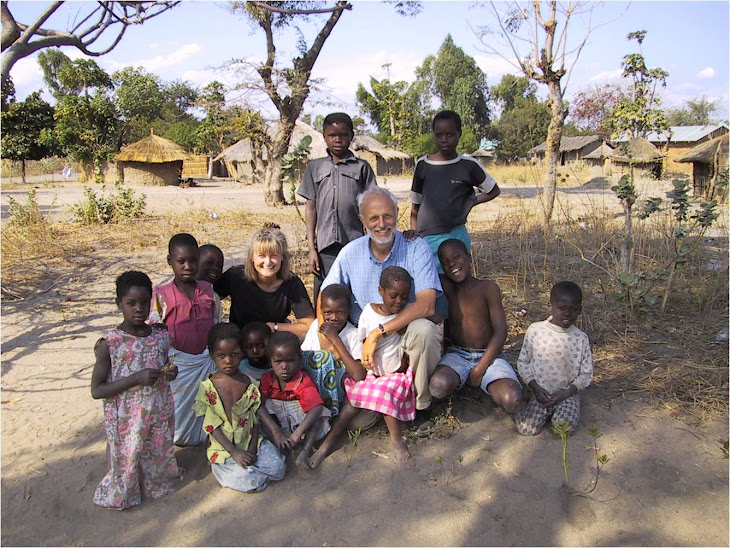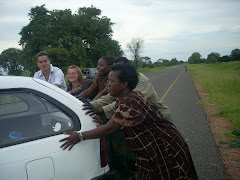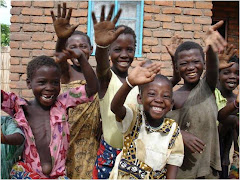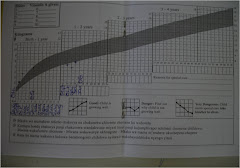Notes from the Village # 2
Welcome Home. Wednesday, February 16, 2011
Two of our Malawian neighbors were already sitting on our Khonde (porch) waiting for us when we arrived at our thatched roof cottage at Palm Beach at noon last Saturday. Over the next 6 hours until nightfall, we (mainly Ruth) held court for total of 15 visitors
A blown tire from jumping off the road to miss a truck was the only eventful event from our trip from Blantyre to our cottage at Palm Beach. Before we arrived, we stopped in Mangochi to buy another tire (you never travel without a spare).
Most of our visitors came to greet us on our return and tell of their family happenings since our last visit. Usually it is about the status of their gardens, comments about the dry January (which does not bode well for quality of maize that will be produced) and their family’s health. Always they ask us about our life this past year, inquire about our family and how was our travel. Interspersed are the sickness and death stories.
One of our favorite night watchman who had early tea on our khonde every day, probably in his fifties, died last October. English 28, a coal black, tall, striking visitor from the next door village, lost his newborn son two weeks ago. Dolores, in her late 20’s, a favorite of Ruth’s , who she found a job for, is in the hospital and not doing well with TB associated with HIV. Death is accepted here as a very real and frequent part of life. When Ruth told English how sorry she was about the death of his son. His comment was “It happens”. There is the same sadness, but death is a strikingly more a part of daily life here.
And then there was the gossip, complaints about the government, and the requests! The gossip is much the same as in the states. Who is cheating on their spouses! What friendships have fallen apart in the last year and why? Who lost their jobs and what they did to lose it. As is at home, there sometimes is a kernel of truth, but there is always another side.
The government complaints don’t come from the villagers (because what the government does or does not do has very little impact on them). The complaints come from what I would describe as the Malawian middle class—working as civil servants, clinical officers, leaders of non government organizations (NGO’s). The fuel shortages are driving everyone “crazy” (it is a foreign exchange issue); the incredibly cumbersome bureaucracy (our friend Henry Kangunga spent three days in queues in Blantyre registering his car). There are rotating blackouts of electricity almost every night because of lack of generating capacity. (Our new LED headlamps are very useful). For us, it is a great source of stories and humor. We are here for a month. It you ask a Malawian about how they deal with this, the universal response “It is terrible…” But they have no alternative.
The requests are unique to this part of the world. In the first 24 hours they included chimanga (maize), tennis shoes, milk powder, school fees, bicycle, tubes and tires for a bicycle, electricity for a house, soap and something for his daughter “who had no blood”.
Malawians are very polite and these requests are from villagers whom we know. The requests are genuine. The soap and food requests we can usually honor with the extra soap we always bring and the small packets of rice and sugar that Ruth always buys when she arrives. For the more substantial requests we let them know that most all of our extra money goes to the Malawi Children’s Village but we will see how much of our money is left at the “end of the day”. When we leave, most of our clothes and especially tennis shoes stay here. One year when we left our cottage, I drove out in bare feet because I had an extra pair of shoes at the Malawi Children’s Office down the road. I must admit there is a certain satisfaction in giving your stuff away…especially to the folks from the village whom you know.
After a few days, it is easy to get into the rhythm of life here, very much set by the sunrise and sunset (almost equal in this part of the world 6 am to 6 pm). At 5 am (to beat the sun, we are in bed by 8 pm)) on our first morning at Palm Beach, we took off on our morning run up the mile of dirt road to the main highway. On our return, there was this great commotion behind us. It was the running club with matching Alaska Pacific University Fun Run Tee shirts who were trying to get our attention. The running group had been established by the 15 faculty and students on a work/study program from APU a few weeks earlier. We had heard rumors that they existed and might surprise us. They did. With much fanfare, we struggled to keep up with them back to our cottage. We have been running we them every morning. More truefully, trying to keep up.
Yesterday, I was running ahead with one of the 14 y/o boys, Ruth and the others were behind us. I though I understood his question, but had to repeat it,”Where did you find her?” I was temped to say, the local Kandodo store, but realizing that English is a second language for him told him the truth (secondary school). His response: “she is a wonderful woman”. It does not get much better than this, and I could not agree more.
As I write this it is 7 am at the cottage we are waiting for petrol (gas) to arrive. We had a several day respite, and then nothing. The rumors are it should arrive today...and we have cell phone connections up and down the highway watching for the fuel truck. We have just enough to make it into Mangochi to refuel, perhaps a bit more. In the meantime, you change your plans for the day and drink Chombe Tea. As the locals say with a smile, “This is Malawi”!!
Wednesday, March 16, 2011
Friday, March 11, 2011
Wind control/fuel shortage cripples the country
Malawi first day 2/11/11
You have to love a country when in the midst of a national fuel shortage; the parliament is debating legislation making flatuance a crime. “Since the country embraced multiparty politics 16 years ago, people have felt free to fart anywhere” said Constitutional Affairs Minister George Chaponda. “Public farting has been encouraged by democracy”
We arrived two days ago. The first challenge -getting from the airport. We had warning. We received a brief email missive in JoBurg from old Malawian friends from Peace Corps days. Dr Dick Chilemba and his wife Leona were with us at Nhkata Bay 45 years ago.. ”Severe fuel shortages……working on getting you from the airport to our home”. As I write this we are grounded at their home. The search for petrol is on.
We are in Blantyre- the commercial capital of Malawi. It was named for the birthplace of Dr David Livingstone (Blantyre, Scotland) the first non African to see the “Lake of Stars” (Lake Malawi) so named by the sparkling reflections of the noonday sun..
We are on our annual trip to the village based HIV AIDS Malawi Children’s Village-up country, 4 hours from here. It is also our annual trip to the have-not part of the world.
As a good Anglican friend, one of our MCV Board member colleague from North Carolina says “It is good for the soul”. Once you settle in and get into the rhythm of life here, new insights take on many dimensions. There are new lessons each day.
You don’t realize how dependent we are on oil-world over.…that is until you don’t have it. Buses don’t run, private vehicles sit idle. Workers stay home. Normal activities of each day are put on hold.
At times like these here, those living in subsistence fare much better. They hardly notice. They don’t use petrol nor do they have electricity. One’s daily food almost exclusively is from what they raise and have stored form last year. A cash economy does not exist. Put away any idealized notion of what this life is like. Subsistence has a great price: lack of clean drinking water; pit latrines or the bush for a bathroom; a thatched room , even good ones, that will leak in the blinding rain that frequents this time of year; lack of access to medical care especially Malaria the most frequent killer in the lakeshore where are where we live. This all equals high infant morality, and a shortened lifespan. When we arrive soon at our cottage we will hear of those whom we know have died in the last year. There will be many.
Malawi is not a place for the impatient. Those who live by a well planned day would not do well here.
This was yesterday. Petrol was found; we were packed and planned on leaving a 1 pm. Shuqar,the driver, had arrived at 6:30 am, early enough so the car could get an updated registration from the Motor Borough. We were well ahead of the curve!!! Or so I thought.
We sent Shuqar (who works forDr Dick Chilemba) off for the registration but had not heard from him by 12. I called on his cell phone (a useful innovation widely used here). The registration had not happened today, but maybe tomorrow. Confused, I called Dick who had the real story. When Shuqar arrived, they first asked to see his license which had expired. The car was impounded!!
Fortunately Shuqar called Dick (who is well known and one of the senior physicians in the country) who went to the police station, paid a fine, got the car, and started the registration process. It involved a lot of queues: one for the initial paperwork, another to pay the fee at a bank, a third for issuing the certificate…..and the queues are long and the bureaucrats are slow. As our Malawi friends say with a smile, “This is Malawi”.
Long story short, we were in Blantyre for 2 ½ days before we left for our cottage.
As I have noted in the past, at home when I am taking a shower in the morning, I go through my plan for the day. It usually happens. Here I use to do the same, however here no day goes as planned. Each day is a new adventure and there are always plenty of them.
You have to love a country when in the midst of a national fuel shortage; the parliament is debating legislation making flatuance a crime. “Since the country embraced multiparty politics 16 years ago, people have felt free to fart anywhere” said Constitutional Affairs Minister George Chaponda. “Public farting has been encouraged by democracy”
We arrived two days ago. The first challenge -getting from the airport. We had warning. We received a brief email missive in JoBurg from old Malawian friends from Peace Corps days. Dr Dick Chilemba and his wife Leona were with us at Nhkata Bay 45 years ago.. ”Severe fuel shortages……working on getting you from the airport to our home”. As I write this we are grounded at their home. The search for petrol is on.
We are in Blantyre- the commercial capital of Malawi. It was named for the birthplace of Dr David Livingstone (Blantyre, Scotland) the first non African to see the “Lake of Stars” (Lake Malawi) so named by the sparkling reflections of the noonday sun..
We are on our annual trip to the village based HIV AIDS Malawi Children’s Village-up country, 4 hours from here. It is also our annual trip to the have-not part of the world.
As a good Anglican friend, one of our MCV Board member colleague from North Carolina says “It is good for the soul”. Once you settle in and get into the rhythm of life here, new insights take on many dimensions. There are new lessons each day.
You don’t realize how dependent we are on oil-world over.…that is until you don’t have it. Buses don’t run, private vehicles sit idle. Workers stay home. Normal activities of each day are put on hold.
At times like these here, those living in subsistence fare much better. They hardly notice. They don’t use petrol nor do they have electricity. One’s daily food almost exclusively is from what they raise and have stored form last year. A cash economy does not exist. Put away any idealized notion of what this life is like. Subsistence has a great price: lack of clean drinking water; pit latrines or the bush for a bathroom; a thatched room , even good ones, that will leak in the blinding rain that frequents this time of year; lack of access to medical care especially Malaria the most frequent killer in the lakeshore where are where we live. This all equals high infant morality, and a shortened lifespan. When we arrive soon at our cottage we will hear of those whom we know have died in the last year. There will be many.
Malawi is not a place for the impatient. Those who live by a well planned day would not do well here.
This was yesterday. Petrol was found; we were packed and planned on leaving a 1 pm. Shuqar,the driver, had arrived at 6:30 am, early enough so the car could get an updated registration from the Motor Borough. We were well ahead of the curve!!! Or so I thought.
We sent Shuqar (who works forDr Dick Chilemba) off for the registration but had not heard from him by 12. I called on his cell phone (a useful innovation widely used here). The registration had not happened today, but maybe tomorrow. Confused, I called Dick who had the real story. When Shuqar arrived, they first asked to see his license which had expired. The car was impounded!!
Fortunately Shuqar called Dick (who is well known and one of the senior physicians in the country) who went to the police station, paid a fine, got the car, and started the registration process. It involved a lot of queues: one for the initial paperwork, another to pay the fee at a bank, a third for issuing the certificate…..and the queues are long and the bureaucrats are slow. As our Malawi friends say with a smile, “This is Malawi”.
Long story short, we were in Blantyre for 2 ½ days before we left for our cottage.
As I have noted in the past, at home when I am taking a shower in the morning, I go through my plan for the day. It usually happens. Here I use to do the same, however here no day goes as planned. Each day is a new adventure and there are always plenty of them.
Subscribe to:
Posts (Atom)






